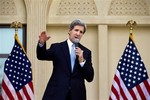Article by WN.com Correspondent Dallas Darling. "Cry, the beloved country, for the unborn child that is the inheritor of our fear." -Alan Paton
Instead of "Cry, the Beloved Country," perhaps Alan Paton should have written a novel entitled, Cry, the Beloved Continent." Although Paton's book was about South African blacks and their experiences of racial injustices and hardships under white rule, it could still be considered a present day account of how true democratic reforms and peaceful governance have yet to emerge across much of Africa's continent.
In South Africa, eight police were suspended for dragging a Mozambique taxi driver to death. The victim was beaten, bound to the back of a pickup with his arms, and then dragged through a busy street of onlookers. President Jacob Zuma assured the nation and world that South Africa was a democratic country which stressed human rights. In August, police shot to death 34 peaceful striking workers at a platinum mine.
Democratic and peaceful protests in Guinea were just met with bullets. At least 5 political opponents and opposition protesters were shot and killed by security forces in the capital before election preparations. Dozens of other people, including two young girls ages six and eight, were also wounded. Repeated civil unrest, frequent looting, and clashes between ethnic groups have also gripped the African nation.
Nigeria is still reeling from President Goodluck Johathan's "state of emergency" and its civil war. Nigerian forces have also been accused of serious human rights violations that included torture against innocent civilians, extrajudicial killings, and massive air assaults against Boko Haram and other suspected militants. Even Secretary of State John Kerry cautioned that, "One's person's atrocity does not excuse another's."
Kerry and other leaders from France, Brazil, China, and UN Secretary General Ban Ki-moon, were in Ethiopia celebrating with 54 other African leaders the 50th anniversary of the African Union (AU). (The AU was formerly known as the Organization of African Union). Some Leaders boasted of the continents liberation from colonial rule and its freedom from poverty. Others declared, "...Africa is rising."
But a few African leaders were more realistic, admitting that the ongoing wars in Somalia, Sudan, Chad, and Mali, along with the autocratic and corrupt rulers in the Democratic Republic of Congo, Ivory Coast, and Zimbabwe remain problematic. Still, some African leaders toned down the optimism by claiming that the kind of self-reliance and economic independence of their founders spoke of remains a bit elusive.
Sadly, so does true democracy and democratic governance. And just like the democratic states of their bygone colonial rulers, democracy is still in a "transitional" state. In other words, in order for democracy to be successful, major social and political questions (such as redistribution of wealth and power sharing) must be kept in the forefront. What often occurs is a thin, superficial democracy.
In a thin, superficial democracy, the previously disenfranchised majority is empowered, but the old elite retains considerable authority, and the structure of society remains largely unchanged. A shallow democracy also continues to maintain past institutions that deeply divide and fracture social groups. What occurs is a democracy that functions quite comfortably with vast inequalities of wealth and power.(1)
Foreign banking institutions and corporations remain fixed in transitional democracies too through predatory investment schemes and technological dependency, which often oppresses the working classes and destitute. While economics replaces historical identity, justice, and restitution, voting rarely changes the status quo. In order for pure democracy to occur, then, all participants must negotiate from an absolutely "equal" position.
South Africa is a good example of a transitional democracy and how colonial bonds are hard to break. Using a 1956 British colonial law, lawyers defending the police have charged the surviving protesting miners with the murder of 34 of their colleagues. (Recall it was the police that herded the Marikana miners into a holding cage surrounded by steel razor wire and then shot them to death. Also, what role did Lonim Platinum play?)
A more recent transitional democratic bill was just passed when South Africa's parliament passed a secrecy bill that protected state information. The apartheid-era legislation will punish reporters, imprisoning them of up to 25 years or a lifetime, for either leaking or declassifying government secrets. It is obvious that the new law is aimed at investigative journalists and whistleblowers.
Paton was a principal of an all-black reformatory. He introduced controversial reforms, one major instrument being liberation! His story (written in 1948, the same year as Orwell's 1984 novel) was about a Zulu pastor and his son who murdered a white man. Paton examines the son's personal guilt and responsibility and the collective guilt of a society that creates such disparity in equality and living conditions.
Paton also addressed the decay of tribal culture, the poverty of the reserves, and the flight of the people to overcrowded urban centers. He warned against the tendency to ignore the underlying causes of African crime, which he believed was due to the disintegration of tribal life and traditional family bonds under the impact of Western economic and cultural exploitation. Paton hoped humanity's empathy and compassion would someday prevail.
"Cry, the beloved country, for the unborn child that is the inheritor of our fear..." ends with: "Let him not love the earth too deeply. Let him not laugh too gladly when the water runs through his fingers, nor stand too silent when the setting sun makes red the veld with fire. Let him not be too moved when the birds of his land are singing, nor give too much of his heart to a mountain or a valley. For fear will rob him of all if he gives too much."
Dallas Darling (darling@wn.com)
(Dallas Darling is the author of Politics 501: An A-Z Reading on Conscientious Political Thought and Action, Some Nations Above God: 52 Weekly Reflections On Modern-Day Imperialism, Militarism, And Consumerism in the Context of John's Apocalyptic Vision, and The Other Side Of Christianity: Reflections on Faith, Politics, Spirituality, History, and Peace. He is a correspondent for www.worldnews.com. You can read more of Dallas' writings at www.beverlydarling.com and wn.com//dallasdarling.)
(1) Foner, Eric. Who Owns History? New York, New York: Hill and Wang Publishers, 2002., pp. 95, 96.























































